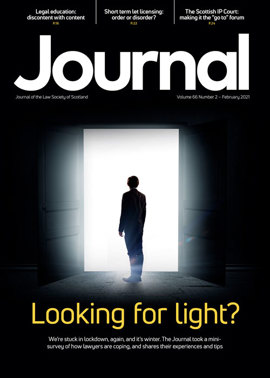In-house: Wide world of in-house

Where do you come from, and what was your career path to your current position?
My legal career started in 2003 as a trainee solicitor at Scottish Borders Council where, after qualifying, I stayed on as a newly qualified solicitor for a year. I really enjoyed working in-house within local government; however, I was keen to expand my knowledge and experience in intellectual property and information technology law following the completion of an LLM in that field.
I joined Thorntons Solicitors in 2006 in the Education & IP unit of their Business Law team. In this role I had the opportunity to work close to the music industry, and even got to attend T in the Park as a legal adviser. Although I particularly enjoyed the collaborative working in the sector, I found the commercial contract and black letter law aspect of IT law was less appealing to me than I had first thought. An opportunity arose in 2009 to work for Aberdeenshire Council’s litigation team, and I was delighted to be able to work in-house again in “home” territory.
Can you tell us about the opportunities you’ve had and the diversity of roles you’ve undertaken at Aberdeenshire Council?
Back in 2009 when I joined Aberdeenshire Council there were three geographically spread legal teams: North, Central and South. Within each team the legal work was broadly separated into litigation, conveyancing and licensing. Governance, commercial and committee monitoring work crossed all the legal teams to a greater or lesser extent.
As well as being involved in court work, I gained experience in planning and committee monitoring. Following a corporate restructure of the council’s former Law & Administration directorate and the establishment of a new Legal & Governance service (now Legal & People) in 2011, a new Governance team was embedded into the structure, taking the planning law, committee monitoring and licensing work streams together for the first time. My substantive role as a senior solicitor crosses the two areas of law that I enjoy: litigation and governance, and with a lead role in planning law.
How has the landscape changed in recent times in your area of work, and how have you as an in-house solicitor supported those changes?
One of the big changes was the introduction of the public sector equality duty (PSED) in 2011. This was brought in by the Equality Act 2010 and means that public authorities must consider how their actions, policies and decisions affect different groups of people in different ways and how they must integrate equality and good relations into their business. I had a lead role in helping to establish the council’s processes and procedures in complying with the PSED, in training elected members and officers and developing the council’s equality impact assessment documentation. Ten years on, this work forms the basis of the council’s everyday activity across all of its work.
Another key function of the council’s legal service is supporting the elections function and the returning officer for the Aberdeenshire area. In January 2019, I was seconded to the role of elections coordinator and was tasked with undertaking a rapid improvement project to review and improve the council’s elections structure. This project was planned at a time when no elections were scheduled for more than two years (with the exception of electing a board member to the Cairngorms National Park Authority that March) but, as it transpired, we required to deliver a European election in May 2019, then there was a snap UK general election in December 2019 and then Aberdeenshire held the first mainland UK by-election during the COVID-19 pandemic in October 2020.
Although elections are a creature of statute and it’s vital that the elections coordinator understands and can interpret the relevant legislation, the role of the coordinator is much broader than that. It incorporates the organising of polling stations and the counting of ballots, as well as recruiting and training all the staff required to support the delivery of the election.
What are the current hot topics in your sector?
The response to the pandemic is undoubtedly the biggest challenge for local government now. I’m the legal adviser to the council’s Risk & Resilience team and am responsible for reviewing the UK and Scottish coronavirus legislation. I have to identify what is applicable to local authorities and provide guidance to colleagues in the relevant service – whether that’s environmental health, enforcement, health or social care.
I have sat on several civil contingencies and recovery groups which are organising and supporting humanitarian assistance to residents affected by isolation and shielding, mobilising staff to recovery efforts and critical service delivery. The pandemic has certainly brought into sharp focus the definition of “urgency” and what work is essential for local authorities to deliver their core and statutory services with an ever-dwindling budget.
What motivates you to head to work?
Without being too clichéd, it’s about being able to make a difference and have a positive impact in the local community. Local authority solicitors have a unique and privileged position in assisting colleagues to deliver services in the local area. The current economic situation is a challenge and we’ve had to change the way we work. Understanding the legislative framework for local authorities and how services are delivered means that in-house lawyers can support the changes that need to be made (not least because of the pandemic), but we can embed organisational strategy, governance and best practice into service delivery and realise tangible outcomes for the community.
How have attitudes and working practices changed in the law since you started out?
Aberdeenshire Council, as an organisation, was an early adopter of flexible working, but the benefits of this policy were particularly promoted by the head of Legal & People to staff within her service. There was a willingness to remove core working hours and provide staff with the technology and equipment to work flexibly. An outcome-focused approach to service delivery means there is the ability to get the work done and have a good work-life balance.
Would you encourage young lawyers to work in-house as a career option?
Absolutely, yes. There is no need to have worked in private practice first – a traineeship with a local authority is much more analogous to a traditional traineeship with a law firm. We cover litigation, property law, commercial work and governance. I’m the lead tutor for the public administration law course at the University of Aberdeen and I encourage students to consider a career in local government.
The breadth of work is there, as is the opportunity to be involved in niche or bespoke areas of law. A local authority trainee is directly involved in high import work from a very early stage and not confined to research. There’s the ability to specialise in-house or be a more general practitioner. Former colleagues have moved on to work in private practice and the bar as equally as we have colleagues who have moved from private practice in-house. It can also be the launch pad for other senior positions within the organisation.
What is your most unusual work experience?
Much of my work experience has been unusual. However, this has mostly been a reflection of the breadth and variety of the work involved.
Some of the matters I have worked on have attracted far more media interest, such as the time when the Trump Organisation was seeking planning approval for its golf courses on the Menie Estate near Balmedie. I was involved in providing planning and governance advice to officers and elected members during much of that period – one of my more unusual experiences was defending the council in a legal battle with the then US President-elect over a flagpole on the grounds of one of his courses.
Other cases, while having less public profile, have had more legal significance. For example, a guardianship application of mine that started out at Aberdeen Sheriff Court was appealed by the adult’s sister; this allowed the opportunity to appear at the newly established Sheriff Appeal Court in one of the first cases to be heard by that court following the extension of its jurisdiction to civil matters. The case went on to be determined in the Inner House in a decision that has clarified the procedure to be followed in opposed applications for welfare guardianships and the approach to be taken to the use of mental health officer reports in such cases.
What some may consider a more mundane example involved a case brought against the council by a resident objecting to its street cleanliness operations. It was, however, the first case of its kind in Scotland, and following the publication of the 74-page judgment of Sheriff Andrew Miller I was invited to give a presentation on the case to a meeting of the Association for Public Service Excellence. Does that make me the leading expert on local authority road cleaning?
What would you put in room 101?
Since we all went back into temporary lockdown at the start of this year, having to stay at home and also work there throughout the week, it sometimes feels like I have already been put in room 101. The thing I have most recently put in that room is an office chair that one of my colleagues kindly delivered to my home – I am most grateful to her for this as it is far more comfortable than the metal folding chair I was using beforehand!
Regulars
Perspectives
Features
Briefings
- Criminal court: Discount season
- Family: Capital values in uncertain times
- Employment: Can employers require staff vaccination?
- Human rights: Protecting the child claimant
- Pensions: a bill with teeth
- Charities: commerce as public benefit?
- Property: Playing safe: on the right track?
- In-house: Wide world of in-house
In practice
- Priorities for our Parliament
- The Word of Gold: The gift that keeps on giving
- TRS: more trusts, more information, more access
- A proper conclusion
- The Eternal Optimist: Putting resolve into resolutions
- Appreciation: Professor Emeritus Robert Rennie
- Ask Ash: Trainee in a rut
- Royal Faculty invites new members







